Drinking Water Supply through Domestic Rainwater Harvesting Systems, Ampara District, Sri Lanka – Phase ll
| Project Area | Ampara District, Sri Lanka |
| Duration | 1st December 2007 - 31st August 2008 (9 months) |
| Funded by | Malteser International |
| Project goal | The project purpose is to improve water supply to vulnerable householders in order to improve their living conditions and to prevent water- related illnesses including diarrhoeal diseases. |
| Project Target | 140 householders and 10 schools |
Activities
| Activity | Details | Results | |
|---|---|---|---|
| 1 | Selection of Project Area | The priority to be given to Tsunami affected people in the rural villages and poor peri-urban settlements where reliable water supply do not exist. | 6 areas selected: Komari, Pansalgoda (Bogaslanda), Panama North-Aluthgammanaya, Panama North- Deewara Gammanaya, Sastrawela, and Aranthalawa. |
| 2 | Awareness programme | One awareness programme targeting Government officials, local authorities, local and international non-Governmental organizations. Five awareness meetings with community to be held at the identified Divisional Secretariat divisions. | Awareness programme was conducted for government officials, stakeholders and national and international agencies working in the area on 14 th February 2008. It was attended by 23 persons from both the government and non –government organizations. 5 awareness sessions for beneficiaries were conducted at Komari, Pansalgoda (Bogaslanda), Panama North, Sastrawela, and Aranthalawa. |
| 3 | Construction of Demonstration Rain Water Harvesting (RWH) Systems | 10 RWH demonstration systems with a stock tank for easy withdrawal of water to be established in identified schools. | 10 schools were selected out of the 18 surveyed schools and constructed 20 m3 partial under ground demonstration RWH tanks. |
| 4 | Mason Training | Five masons to be “trained of the job” during the implementation. Further training program to be conducted for a selected group of mason (5) on construction of partial under ground tanks. Meetings with local masons to share their experiences | 2 masons were trained on construction of above-ground tanks through “on the job training”. 7 masons were trained on construction of 20 m3 partial underground tanks. Several meetings were conducted with the trained masons and the masons who were trained through “on the job training” to discuss problems, constraints and challenges during the implementation. |
| 5 | Selection of 140 beneficiary families | RWH systems to be constructed for 140 selected households. This system consists of 5 m 3 ferro-cement above ground tanks, 2 length of gutters and valance board, a first flush devise, tank lid and outlet pipe with base. | Meetings were held with NWSDB officials to identify sites for implementation of project. An extensive list of water scarce areas was received for both tsunami affected and non-affected areas in Ampara district from the NWSDB. |
| 6 | Construction of family RWH tanks | Construction of 140 RWH tanks. | 146 RWH tanks (with 6 additional tanks) were constructed. |
| 7 | Operation and maintenance training for beneficiaries | Operation and maintenance trainings will be given to all beneficiaries of household level and demonstration tanks. | Operation and Maintenance of RWH tank programs were conducted at all 5 beneficiary sites. Similar programs were conducted at all 10 school sites. |
| 8 | Research and Development | Research to be conducted to improve the following components in the RWH system 1. Indicator for water availability of the tank 2. Inlet filter 3. First flush 4. Out flow arrangement. | Tank lid with a curved side was tried out and modified. |
| 9 | Hygiene promotion activities | Hygiene promotion activities on personal hygiene to reduce the incidence of water related diseases for the right holder families | A KAP survey was conducted to assess the hygiene knowledge. Hygiene promotion was conducted at each of the 6 beneficiary sites as well as schools by Malteser International and LRWHF staff. Hygiene behavior activities were conducted in connection with also the Operation and Maintenance meetings, mentioned above. |
| 10 | Project monitoring | Monthly progress meetings and frequent site visits to be carried out. | LRWHF staff conducted monthly progress meeting and frequent site visits with Malteser International staff. |
Photo Gallery
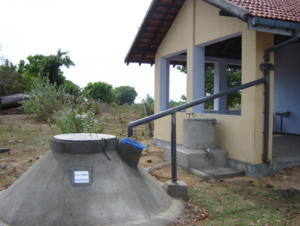 20 m3 partial underground tank at Maha Oya school | 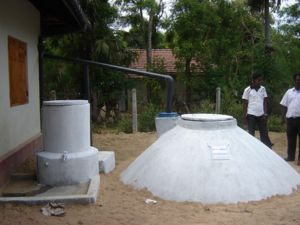 20 m3 partial underground tank at Veerachcholi Vidayala, Samanthurai |
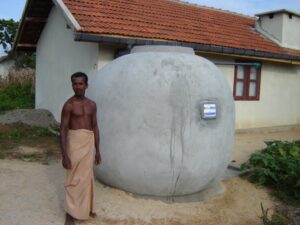 Household tank at Panama | 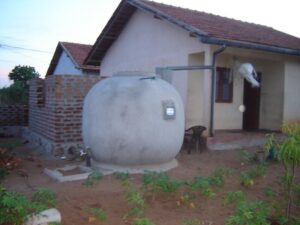 Household tank at Arantalawa |
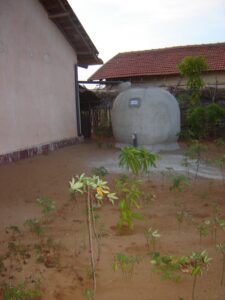 Household tank at Komari | 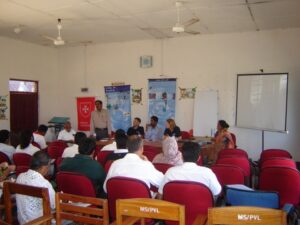 Awareness program at Pottuvil D.S. office |
